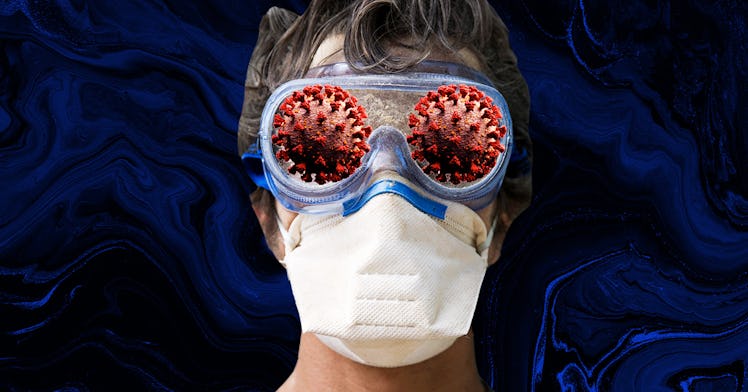Coronavirus Goggles and 3 Other Weird COVID Prevention Products That Work
Time to bust out the goggles and nose sanitizer.

You already know to wear a mask, social distance, and wash your hands often. But if you’re at high risk of getting severely sick with COVID-19, or if you’re very worried about your family’s health, you probably want something more. Isn’t there anything else you can do to boost coronavirus prevention in your family?
Yes, but, they’re not exactly accepted by science — or society. Some of them are backed by limited evidence; others are just bizarre; none are part of the blanket CDC recommendations (although Anthony Fauci has personally endorsed the first). You probably don’t need them for a trip to the grocery store, but if you want that extra sense of security or have to go into a high-risk environment, they can help. Here are extra ways to reduce your COVID-19 risk, even if you’ll look wild doing them.
Wear Goggles
Slapping a pair of goggles on your face can prevent you from getting infected by the coronavirus. The same way that the virus can get into your body via your mouth and nose, it also can from your eyes — one reason that you’re not supposed to touch your face without washing your hands. “If you have goggles or an eye shield, you should use it,” Anthony Fauci, the top infectious disease specialist in the U.S., told ABC News. The same way masks offer some protection to your mouth and nose against droplets containing the virus, goggles do for your eyes.
If you don’t want to look like a mad scientist, glasses and sunglasses can protect your eyes, though droplets can get in from the sides, according to the American Academy of Ophthalmology. If you wear contacts, it may be best to switch to glasses during the pandemic, especially because people with contacts touch their eyes more often.
Experts recommend wearing eye protection in high-risk situations, such as when caring for someone with COVID-19 or traveling on a crowded airplane. But don’t put all your bets on goggles. A review study from June found that eye protection decreases coronavirus risk, but it also concluded that the evidence was weak. And the path to your respiratory system is less direct from the eyes than the nose and mouth, so it may be harder to get COVID-19 this way.
Sanitize Your Nose
Sanitizing your nose the way you sanitize your hands could reduce your risk of getting COVID-19. But don’t go shooting hand sanitizer up your nostrils. There are specific products made to help, such as the Nozin® Nasal Sanitizer®, which you swab on the inside of your nostrils for 12-hour protection and a “soft smell of citrus.” Think of it like washing your hands, but for your sniffer. Do it in private and no one even needs to know.
Though it sounds ridiculous, nose sanitizing actually works. The Sanitize Your Nose campaign is backed by a full board of qualified doctors and nurses. The nose is a “perfect warm, moist, hairy reservoir where harmful germs can grow and multiply,” Ron Singer, an orthopedic surgeon, and advisor to the campaign, told FOX Rochester. Nasal cleaners kill those germs and offer daily protection against them, though they have not been tested against COVID-19 specifically.
Wear Masks That Open When You Eat
Though staying home is your safest option, there are masks that allow you to eat on the go if you must. Some of these masks have a zipper you can unzip to pop food into your mouth, like this black number that would be equally at home in a bondage film. Others come with a hole you can stick a straw through for drinking and close when you’re done, like these floral masks. They look absurd, but in theory, they make it less likely you’ll get or transmit COVID-19 while chowing down. However, they aren’t tested. Many of the designs don’t have perfect coverage, so don’t treat them as your go-to mask. But if you need to eat or drink in public, they can offer extra protection.
Get Your Vitamin D
Sounds like bullshit, right? Take these vitamins and you’ll be COVID-free! But Vitamin D may reduce your risk of coronavirus infection or help you get better if you do get COVID-19, according to a new commentary in The Lancet. Though there isn’t any conclusive evidence in regard to COVID-19, past studies have shown that Vitamin D protects against other acute respiratory infections. It makes sense Vitamin D would help fight against the coronavirus too because it supports antiviral mechanisms in the body. If you want more Vitamin D, take a supplement or spend 5 to 10 minutes outside without sunscreen most days of the week.
This article was originally published on